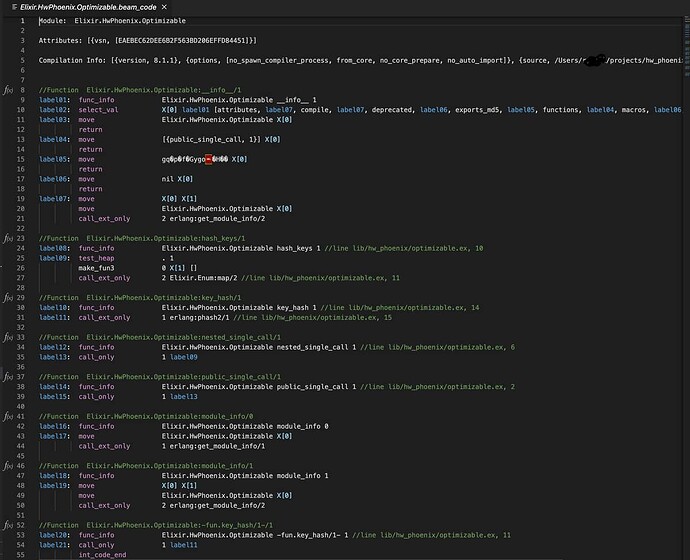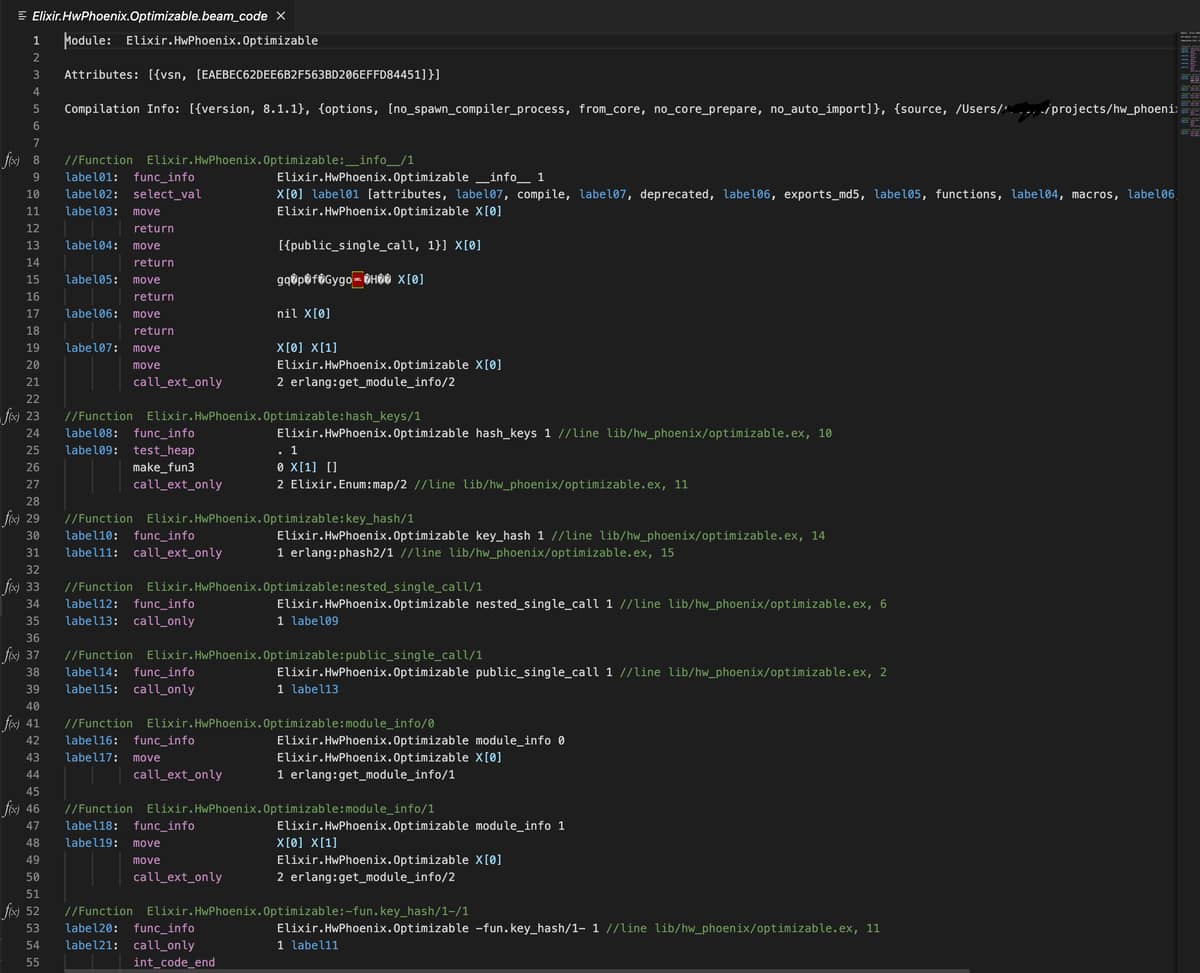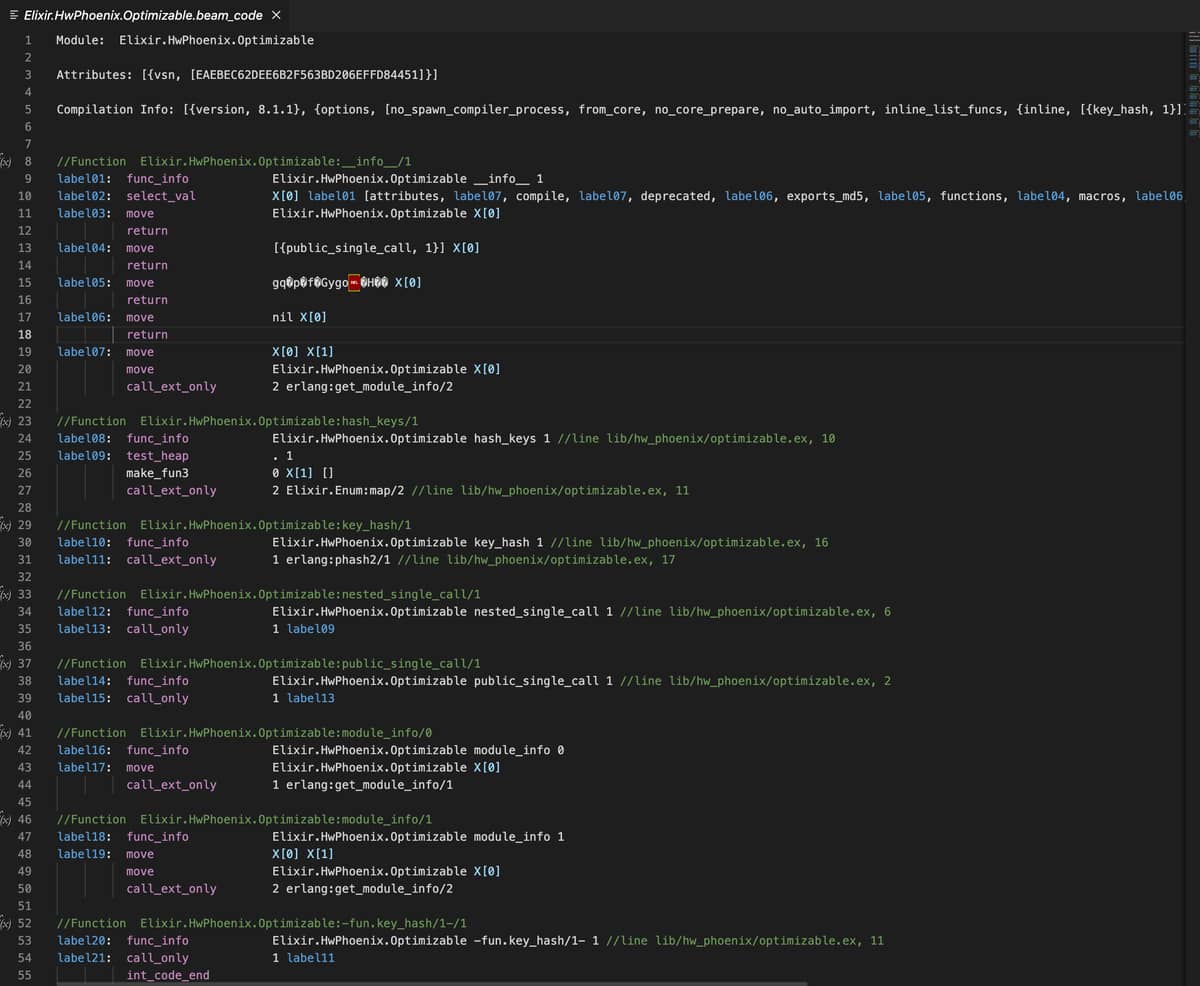Hello!
I would like to inspect the final code that is executed, and I don’t know how to do it.
Question 1: Coming from C, what could be the nearest thing to inspect the assembly code generated by -O0 or -O2, for instance, in Elixir/Erlang?
It is ok if it is some sort of assembly or other erlang representation, but I would like to see the final optimizations performed (or the last thing we can get before jumping to the JIT compiler, etc).
Question 2: Does Mix perform any code optimization when doing MIX_ENV=prod mix compile compared with mix compile? The former builds in _build/prod, while the latter in _build/dev but when decompiling the final beam files I don’t see any differences. Can be a problem regarding my decompilation tools? or the optimizations are not produced at the beam level?
Question 3: My purpose is to know if a code like this is inlined by default:
defmodule HwPhoenix.Optimizable do
def public_single_call(keys) do
nested_single_call(keys)
end
defp nested_single_call(keys) do
hash_keys(keys)
end
defp hash_keys(keys) do
keys |> Enum.map(&key_hash/1)
end
defp key_hash(key) do
:erlang.phash2(key)
end
end
If it is compiled with mix compile (I assume MIX_ENV=dev mix compile is exactly the same), I can expect that these functions are probably not inlined, but if I do MIX_ENV=prod mix compile I would like that some of them are inlined, generating a final code that could be something close to this representation:
defmodule HwPhoenix.Optimizable do
def public_single_call(keys) do
Enum.map(keys, &:erlang.phash2/1)
end
# Eg. if the next 2 were also public, also inlined here:
#
# def nested_single_call(keys) do
# Enum.map(keys, &:erlang.phash2/1)
# end
#
# def hash_keys(keys) do
# Enum.map(keys, &:erlang.phash2/1)
# end
end
Is any function inlined by default under certain conditions?
Question 4: Can the compiler detect and eliminate dead code?
For instance, in the previous example, if we have 3 public functions def, but we only use one of them from other modules, the compiler may remove the rest. I suspect it is not done, but do we have any tool, compiler option or way to do that? Maybe the only option is to use a tool like dialyzer, providing suggestions, and we have to manually remove them.
Furthermore, does the erlang runtime gain anything if we remove code? I assume less RAM consumption, but anything in terms of speed? I suspect that is really minor optimization, and we can obtain some benefit only if we remove functions that have the same signature (name/arity), to facilitate the pattern matching operation. Is it correct?
Question 5: How can I check that inline is doing what I expect?
I have marked hash_keys as inlined (even including the other compiler option in case it would affect), but I don’t know how to check that the beam file is effectively with hash_keys inlined.
defmodule HwPhoenix.Optimizable do
def single_call(keys) do
nested_single_call(keys)
end
def nested_single_call(keys) do
hash_keys(keys)
end
def hash_keys(keys) do
keys |> Enum.map(&key_hash/1)
end
@compile :inline_list_funcs
@compile {:inline, key_hash: 1}
defp key_hash(key) do
:erlang.phash2(key)
end
end
I tried three different ways to inspect the final code, and I can see in all of them the key_hash function (which should be inlined). What am I doing wrong? How is the correct way to inspect the final code to be executed?
So, I created two projects: the same modules/code but one without the @compile flags, called normal, and the other inline with those flags shown above. I needed to create two projects since I suspect some IDE extension has problems detecting that the code has change (maybe related with debug_info), so, I want to be sure each .beam file “points” to its proper .ex file (one normal, the other with compiler flags).
Via Visual Studio Code BEAMdasm
MIX_ENV=prod or MIX_ENV=dev generates the same, but still, for this case:
In dev:
In prod:
In prod with inline:
In all cases looks like the same but with different Compilation Info.
Via Jetbrains Elixir plugin
In any of the three ways (dev, prod, prod inline flags):
# Source code recreated from a .beam file by IntelliJ Elixir
defmodule HwPhoenix.Optimizable do
# Functions
def __info__(p0) do
# body not decompiled
end
def module_info() do
# body not decompiled
end
def module_info(p0) do
# body not decompiled
end
def public_single_call(keys) do
nested_single_call(keys)
end
# Private Functions
defp unquote(:"-fun.key_hash/1-")(p0) do
# body not decompiled
end
defp hash_keys(keys) do
Enum.map(keys, &:key_hash/1)
end
defp key_hash(key) do
:erlang.phash2(key)
end
defp nested_single_call(keys) do
hash_keys(keys)
end
end
Via decompile tool
Using decompile.
In the normal project (MIX_ENV=prod or MIX_ENV=dev generates the same):
%% MIX_ENV=prod mix decompile Elixir.HwPhoenix.Optimizable --to asm
Retrieving code for Elixir.HwPhoenix.Optimizable
-file("lib/hw_phoenix/optimizable.ex", 1).
-module('Elixir.HwPhoenix.Optimizable').
-compile([no_auto_import]).
-export(['__info__'/1, public_single_call/1]).
-spec '__info__'(attributes |
compile |
functions |
macros |
md5 |
exports_md5 |
module |
deprecated) -> any().
'__info__'(module) -> 'Elixir.HwPhoenix.Optimizable';
'__info__'(functions) -> [{public_single_call, 1}];
'__info__'(macros) -> [];
'__info__'(exports_md5) ->
<<"gq\223p¸fGygo\d\222HÛò">>;
'__info__'(Key = attributes) ->
erlang:get_module_info('Elixir.HwPhoenix.Optimizable',
Key);
'__info__'(Key = compile) ->
erlang:get_module_info('Elixir.HwPhoenix.Optimizable',
Key);
'__info__'(Key = md5) ->
erlang:get_module_info('Elixir.HwPhoenix.Optimizable',
Key);
'__info__'(deprecated) -> [].
hash_keys(_keys@1) ->
'Elixir.Enum':map(_keys@1, fun key_hash/1).
key_hash(_key@1) -> erlang:phash2(_key@1).
nested_single_call(_keys@1) -> hash_keys(_keys@1).
public_single_call(_keys@1) ->
nested_single_call(_keys@1).
In prod with inline:
%% MIX_ENV=prod mix decompile Elixir.HwPhoenix.Optimizable --to asm
Retrieving code for Elixir.HwPhoenix.Optimizable
-file("lib/hw_phoenix/optimizable.ex", 1).
-module('Elixir.HwPhoenix.Optimizable').
-compile([no_auto_import,
inline_list_funcs,
{inline, [{key_hash, 1}]}]).
-export(['__info__'/1, public_single_call/1]).
-spec '__info__'(attributes |
compile |
functions |
macros |
md5 |
exports_md5 |
module |
deprecated) -> any().
'__info__'(module) -> 'Elixir.HwPhoenix.Optimizable';
'__info__'(functions) -> [{public_single_call, 1}];
'__info__'(macros) -> [];
'__info__'(exports_md5) ->
<<"gq\223p¸fGygo\d\222HÛò">>;
'__info__'(Key = attributes) ->
erlang:get_module_info('Elixir.HwPhoenix.Optimizable',
Key);
'__info__'(Key = compile) ->
erlang:get_module_info('Elixir.HwPhoenix.Optimizable',
Key);
'__info__'(Key = md5) ->
erlang:get_module_info('Elixir.HwPhoenix.Optimizable',
Key);
'__info__'(deprecated) -> [].
hash_keys(_keys@1) ->
'Elixir.Enum':map(_keys@1, fun key_hash/1).
key_hash(_key@1) -> erlang:phash2(_key@1).
nested_single_call(_keys@1) -> hash_keys(_keys@1).
public_single_call(_keys@1) ->
nested_single_call(_keys@1).
Only differences:
$ diff -s prod.asm ../hw_phoenix2/prod.asm
6,8c6
< -compile([no_auto_import,
< inline_list_funcs,
< {inline, [{key_hash, 1}]}]).
---
> -compile([no_auto_import]).
The tool decompilerl produces exactly the same output as this tool.
Other tools: beam_disassemble:
I could not decompile since beam_disassemble does not work with recent versions of OTP (issue).
Other tools: decompiler:
Extracted from this gist.
#!/usr/bin/env escript
%% -*- mode: erlang -*-
main([BeamFile]) ->
{ok,{_,[{abstract_code,{_,AC}}]}} = beam_lib:chunks(BeamFile,[abstract_code]),
io:fwrite("~s~n", [erl_prettypr:format(erl_syntax:form_list(AC))]).
./decompiler.erl _build/dev/lib/hw_phoenix/ebin/Elixir.HwPhoenix.Optimizable.beam
escript: exception error: no match of right hand side value {error,beam_lib,
{missing_backend,
"_build/dev/lib/hw_phoenix/ebin/Elixir.HwPhoenix.Optimizable.beam",
elixir_erl}}
in function erl_eval:expr/5 (erl_eval.erl, line 450)
in call from escript:eval_exprs/5 (escript.erl, line 869)
in call from erl_eval:local_func/6 (erl_eval.erl, line 572)
in call from escript:interpret/4 (escript.erl, line 780)
in call from escript:start/1 (escript.erl, line 277)
in call from init:start_em/1
in call from init:do_boot/3
Therefore, what is the correct way to inspect the final code to be executed, with the purpose of reviewing and understanding how different code optimizations are applied (inlining, code transformations, etc)? What is the de-facto methodology?
Seeing these examples it seems that inline is not produced in the EAF, expanded AST… neither the beam files. But of course, I can be completely wrong.
Thank you in advance.

























